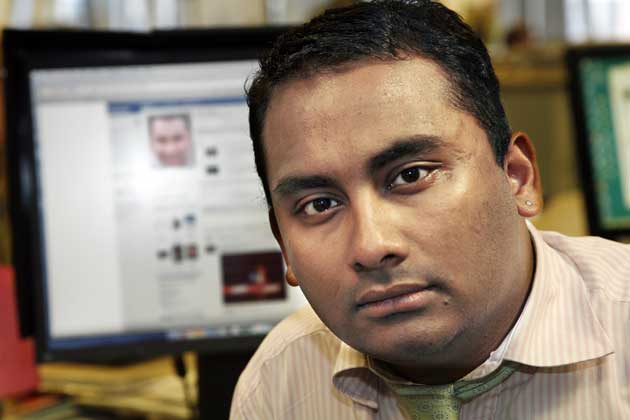How a fraudster stole my identity on Facebook
The victim of an online vendetta has won a libel case. Amol Rajan knows just how much damage can be done

Your support helps us to tell the story
From reproductive rights to climate change to Big Tech, The Independent is on the ground when the story is developing. Whether it's investigating the financials of Elon Musk's pro-Trump PAC or producing our latest documentary, 'The A Word', which shines a light on the American women fighting for reproductive rights, we know how important it is to parse out the facts from the messaging.
At such a critical moment in US history, we need reporters on the ground. Your donation allows us to keep sending journalists to speak to both sides of the story.
The Independent is trusted by Americans across the entire political spectrum. And unlike many other quality news outlets, we choose not to lock Americans out of our reporting and analysis with paywalls. We believe quality journalism should be available to everyone, paid for by those who can afford it.
Your support makes all the difference.The first I knew about it was a phone call. My girlfriend admonished me for succumbing to the temptations of Facebook, a website whose poisoned fruits I had previously said I found unappealing. I stood accused of two crimes: a lack of willpower and a failure to confess.
Not guilty on both counts, I pleaded. Alas, I was the victim of a fraud. Somebody, somewhere – and believe me, I'm pretty sure I know who you are – had launched a vendetta. They hated me. And what a visceral, calculating and malicious hate it was.
A profile was launched under my name which gave personal details including my sexuality, relationship status, political views and date of birth.
Thirteen friends, online nuts all, had befriended whoever was pretending to be me. They included people with whom I have made a concerted effort not to remain in touch. Goodness knows what messages passed between them and my usurper. Did my online self profess love to an ex-girlfriend? Did "I" tell an old schoolmate that I never really liked him anyway?
Once I reported the fraud, Facebook removed the profile – although not without delay. I was assured that a block would be put up to stop anyone else stealing my identity online. In the following months, four profiles of me, each with subtly differing labels, but each including my first and second name, were uploaded onto the site, and simmered there for several months despite repeated requests to Facebook for their removal.
More recently, a named woman set up a fan club called "Amol Rajan fanclub" [sic], with the description "Just for Fun". It contained a highly defamatory and professionally damaging biography of me that was soaked in false information. Another profile, which makes reference to my last job, is still active.
It is now customary to describe Facebook as a modern miracle. The wealth of Mark Zuckerberg, its 24 year-old billionaire founder, does much to give that cliché merit. Online social networking is having a profound effect on the way in which people communicate, chiefly by substituting virtual association for real friendship. In so doing, it is also redefining friendship, giving it more porous boundaries and relaxing the rules by which two people, or a group, interact.
In this respect, as in others, the Facebook phenomenon merits both close attention and respect. Politicians who have their wits about them know it cannot be ignored; witness Barack Obama's extraordinary fundraising prowess, which owes a substantial debt to the capacity of online networking.
Nevertheless, a sceptic should risk sounding priggish in highlighting attendant dangers, to whose existence Matthew Firsht for one can testify.
At present, there are almost no impediments to online identity theft. That means those with a vendetta, such as Grant Raphael, can infect personal relationships and ruin careers.
Online networking also destroys the boundary between public and private. My public identity becomes not so much a consequence of my achievements as of your dodgy snaps from last Friday.
Little would be achieved in wishing Facebook away. In dissolving the boundaries between people in a shrinking world, it is a marker of modernity. But it cannot fulfil its potential, and it could cause immense damage, if users abandon their scepticism, or thieves remain free.
Join our commenting forum
Join thought-provoking conversations, follow other Independent readers and see their replies
Comments